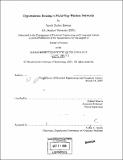Opportunistic routing in multi-hop wireless networks
Author(s)
Biswas, Sanjit Zubin
DownloadFull printable version (5.888Mb)
Other Contributors
Massachusetts Institute of Technology. Dept. of Electrical Engineering and Computer Science.
Advisor
Robert Morris.
Terms of use
Metadata
Show full item recordAbstract
This thesis describes ExOR, an integrated routing and MAC protocol for bulk transfers in multi-hop wireless networks. ExOR exploits the broadcast nature of radios by making forwarding decisions based on which nodes receive each transmission. The spatial diversity among receivers provides each transmission multiple opportunities to make progress in the face of packet losses. As a result ExOR can use long links with high loss rates, which would be avoided by unicast routing. ExOR operates on batches of packets. The source node includes a list of candidate forwarders in each packet, prioritized by closeness to the destination. Receiving nodes buffer successfully received packets and await the end of the batch. The highest priority forwarder then broadcasts the packets in its buffer, including its copy of the "batch map" in each packet. The batch map contains the sender's best guess of the highest priority node to have received each packet. The remaining forwarders then transmit in order, sending only packets which were not acknowledged in the batch maps of higher priority nodes. The forwarders continue to cycle through the priority list until the destination has enough packets to recover the original data using forward error correction. (cont.) An evaluation of an implementation on a 38-node 802.11b test-bed shows that ExOR improves bulk data transfer throughput for most node pairs when compared with unicast routing. For pairs between which unicast uses one or two hops, ExOR's robust batch maps prevent unnecessary retransmissions, increasing throughput by nearly 50%. For longer unicast routes, ExOR takes advantage of spatial diversity, providing gains of a factor of two to four when using a batch size of 10 packets.
Description
Thesis (S.M.)--Massachusetts Institute of Technology, Dept. of Electrical Engineering and Computer Science, 2005. Includes bibliographical references (leaves 45-47).
Date issued
2005Department
Massachusetts Institute of Technology. Department of Electrical Engineering and Computer SciencePublisher
Massachusetts Institute of Technology
Keywords
Electrical Engineering and Computer Science.